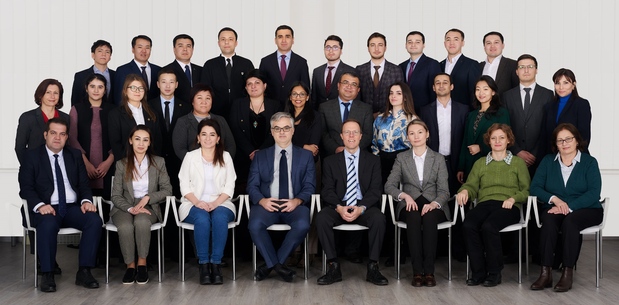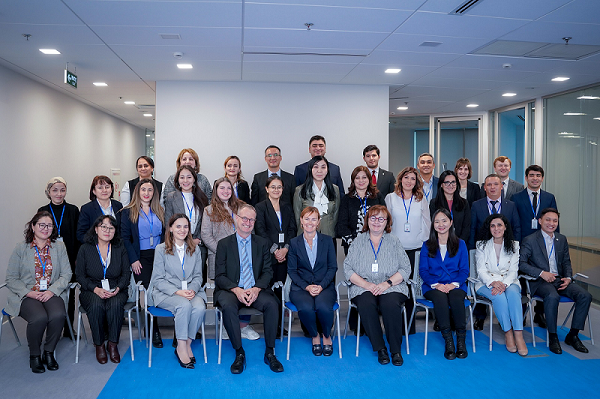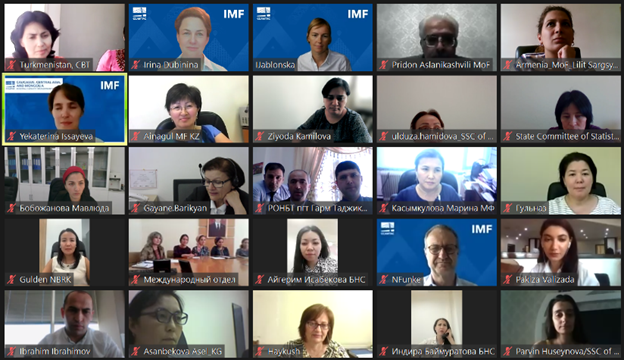Regional Workshops
Fiscal Year 2023
| A workshop was delivered in person with virtual participation of some IMF staff and guest speakers. The target audience consisted of mid-level officials working in the payment, legal, technology, monetary policy, and financial stability departments, and in positions with similar responsibilities at the central banks in the region of CCA. The workshop team provided introductory information about the basic elements of CBDC, from an economic, legal, and technical perspectives, as well as current trends. Some participants contributed by sharing their central bank’s views and progress on CBDC, strengthening the capacity building of central banks of the region in this area. | |||
| The IMF FAD and CCAMTAC hosted a regional workshop in Almaty, to build capacity in estimating and publishing tax expenditures (TEs) in the region. 25 officials from nine countries attended the workshop. A set of slides and template models were provided to the participants mainly covering (corporate and personal) income taxes and the value-added tax (VAT). Specific topics included: the 'benchmark tax system', data requirement, estimation techniques, microsimulation models, evaluation of TEs, current practices of TEs in the region, and the establishment of a tax policy unit. Presentations by the workshop experts provided general guidance while discussions during nine presentations by the authorities addressed country-specific issues at a high-level and fostered peer-to-peer learning. | |||
The workshop was part of a special blended training program developed by IMF’s Statistics Department’s (STA) Balance of Payments in close collaboration with the Institute for Capacity Development (ICD). The main purpose of the workshop was to train staff with limited experience in external sector statistics. Given macroeconomic interrelations, external sector statistics also play an important role for CCAMTACs two other statistics workstreams. The workshop program combined online self-paced material set on the edX platform with instructor-led live sessions delivered in Zoom in Russian. Twenty-six officials representing seven countries attended the workshop.
 |
This was a one-week in-person regional workshop organized jointly by CCAMTAC, Joint Vienna Institute (JVI), and IMF’s Institute for Capacity Development. The objective of this face-to-face workshop was to help officials from the CCAM region use ICD’s Public Debt Dynamics Tool (DDT) for analyzing how public debt in their countries is expected to change over time, and for performing country-specific scenario analyses, with an emphasis on the effects of climate change and natural disasters on public debt. Building on the previous virtual DDT workshops, financed by the China IMF Capacity Development Center (CICDC), this workshop continued to serve as a basis for establishing a peer group / community of practice in the region, encouraging knowledge exchange during and after the workshop. The workshop took place in Vienna (Austria) and was attended by participants from all nine CCAMTAC member countries. | ||
 |
This first in-person CCAMTAC GFS and PSDS regional workshop, conducted by the CCAMTAC resident advisor and a short-term expert, focused on practical aspects of the integrated GFS framework. 27 participants from the ministries of finance, central banks and national statistical institutes of the Center’s eight member countries attended the workshop in person. CCAMTAC also offered the option for online participation. The workshop combined the methodology based on Government Finance Statistics Manual 2014 with practical exercises and with presentations from non-CCAMTAC countries. The workshop helped the participants understand the concept of the integrated GFS framework, harmonized recording of above-the-line and below-the-line transactions, and reconciliation of stocks of assets and liabilities with underlining transactions and other economic flows. Presentations delivered by the SARTTAC resident advisor, Poland and the Slovak Republic highly contributed to the success of this CD activity. | ||
| The workshop aimed to familiarize participants from central banks with key features of the repo-operations, use and users of repo, issues related to repo market infrastructure and global practices in building repo market. For peer discussions participants from Kazakhstan, Georgia, and the Kyrgyz Republic shared their experience and challenges at the repo market. At the workshop participants discussed key aspects for developing an effective true repo market. Extensive discussions touched collateral aspects of repo and its link with the securities markets. Participants were interested in issues related to the development of the repo market in conditions of high counterparty risks, excess liquidity in the system, and shallow financial markets. | |||
| Two-and-a-half-day interactive workshop summarized the history and provided a basic understanding of cryptocurrency and blockchain technology. The event addressed aspects such as classification, anonymity and transacting in cryptocurrencies together with proof of ownership. A practical tax administration example was provided. Emerging challenges and opportunities for tax administrations were outlined along with some discussion of broader policy considerations. 70 participants from 7 CCAM countries attended the workshop, providing a good level of interaction. | |||
 |
This third CCAMTAC GFS and PSDS virtual regional workshop presented the main elements of the first CCAMTAC Regional Note (Note) on GFS and PSDS. The Note provides an overview of the international standards for GFS and PSDS, describes the recent progress in the region and practical examples from member countries, identifies the remaining gaps, and summarizes the priorities for developing high quality GFS and PSDS. It also intends to promote peer learning and as a useful reference point for ongoing reform initiatives. The | ||
| lecturers (authors of the Note) presented to the workshop participants the status of (i) Institutional environment; ii) Data compilation procedures; iii) Data coverage, and iv) Dissemination practices in the CCAMTAC member countries. They also provided an overview of the fiscal statistics and suggested the ways to improving the CCAM countries’ fiscal data. The participants exchanged their experience and views during the group sessions. The Note will be published in the coming weeks. The GFS Resident Advisor of AFRITAC Central shared his experience with the evolution in the GFS and PSDS data compilation and dissemination in the Central African countries since the GFS project was put in place in the region in 2016. Between 60 and 70 participants from the Ministries of Finance, Central Banks and National Statistical Institutes attended the workshop each day. | |||
| This virtual regional workshop was for CCAMTAC’s Revenue Administration workstream and covered topics identified as a priority by six CCAM revenue administrations managing compliance risks in extractive industries. The objectives of the workshop were to provide an overview of the oil & gas and mining industries and related challenges for tax administration. The policy, | |||
| legal and institutional framework for the exploitation and transparent management of natural resources was explained. Presentations focused on the features of tax planning and compliance risk management as these relate to extractive industries. Opportunities for further IMF technical assistance were outlined. The workshop was a step in the development of regional level peer to peer connections to share experience in this specialized area of tax administration. | |||
| During May 18-19, 2022 the CCAMTAC and Monetary and Capital Markets Department conducted the virtual workshop on Reserve Requirements (RR). The workshop aimed to familiarize participants from central banks with the general concept and main specifications of an effective reserve requirement (RR) system. For peer discussions participants from Georgia and Uzbekistan presented their reserve requirement practices and discussed challenges. At the workshop experts elaborated on the purpose of reserve requirements and its | |||
| specifications. Extensive discussions touched main specifications of RR, such as setting right reservable base, RR ratio, correct periods of RR, compliance of RR and approaches to RR’s remuneration and penalty. Experts and participants actively discussed applicability of RR as a de-dollarization measure, role of RR averaging for liquidity management and RR fulfillment practices. Presenters shared their experience and challenges related to RR in different countries. | |||
